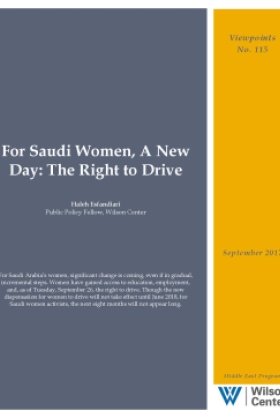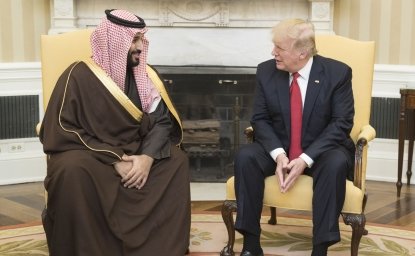For Saudi Women, A New Day: The Right to Drive


Tuesday, September 26, was a big day for the women of Saudi Arabia. A royal edict broadcast across the kingdom carried a message for which they had been waiting for decades: YOU CAN DRIVE. Until the day before, Saudi Arabia was the only country in the world that did not allow its women to sit behind the wheel of a car. The new dispensation will not kick in until June, but for Saudi women activists, who have worked and waited for decades for this simple right without fear of arrest and even imprisonment, eight months will not appear long.
The king of Saudi Arabia has the authority to make and change laws, and even to alter long-ingrained practices. He has used this authority to accord women the right to drive. Interestingly, King Salman bin Abdul-Aziz Al Saud couched the rationale for his new proclamation in both practical and religious terms. He cited “the negative consequences of not allowing women to drive vehicles and the positive aspects of allowing them to do so,” and the benefits of applying traffic regulations and driver’s license standards equally to men and women. Furthermore, he noted that according to scholars, there are no religious grounds for barring women from driving or obtaining driving licenses. He emphasized that the government will take care to apply the new regulation in accordance with the Shari’a, or Islamic law.
One might also point out that the youngest wife of the prophet, Aysha, rode her camel in the desert, as did the wives of the Prophet’s Companions.
The king’s order brings Saudi practice in line with the rest of the Muslim world. Women have for some time had the right to drive in every other Muslim country. In Iran, I often saw a turbaned cleric sitting as a passenger in a car, next to a woman driver. Even in Saudi Arabia, the ban on women driving was not always observed in remote, desert areas. Margot Badran, a Global Fellow at the Wilson Center, recalls that when she lived in Saudi Arabia in the 1980s women were not allowed to drive in the cities, but Bedouin women were transporting their livestock in vehicles from one place to another.
For Saudi women, King’s Salman’s proclamation marks the culmination of a long campaign. As many as two decades ago, there were instances of women driving in the streets of main cities as an act of defiance. In recent years, some of these women posted pictures of themselves behind the wheel of a vehicle on social media. In 1990, fifty women together defied police, risking arrest and the loss of their jobs and their passports, by driving. I met one of these women at a conference in Beirut, and she still remembered the exhilaration she felt on that occasion. In 2014, a Saudi woman activist, Loujain Halthloul, crossed the border from the UAE into Saudi Arabia behind the wheel of a car. She was imprisoned for over two months. Over the years there have been numerous similar incidents of Saudi women ignoring the ban, driving and paying the price.
For Saudi women, the right to drive has also become a practical matter. With the opening up of employment opportunities, driving is a necessity, not a sign of social status. Many women could not work because they lacked transportation. Women need to be able to go to and from their place of work without depending on a male family member or taxis and car services. Besides, not every working woman can afford the luxury of a private chauffeur or the daily cost of taxis.
Overnight, everything has changed. Under the new order, women with a driver’s license from any GCC country can now drive in Saudi Arabia. We will see whether any already-licensed Saudi and foreign women will appear behind the wheel of a car on Saudi streets right away, and how the police will react to them, or whether they will wait until June.
Many questions remain. Can women be instructed by male drivers who are not their next of kin? How soon will the government train women driving instructors or open driving schools for women? Will a woman’s exposed face appear on driver’s license photo? How will the more conservative Saudi provinces react to the ordinance? The Saudi ambassador to Washington, Khaled bin Salman, says that a woman doesn’t need the permission of her guardian to get a driver’s license. But will a woman still need the permission of her guardian to leave the house in order to take a job or even to attend school—the current practice in the Kingdom?
Clearly, for Saudi Arabia’s women, significant change is coming—even if in gradual, incremental steps. They have gained access to education in large numbers, to employment, although not as much as was hoped, and to the public space.
In January 2013, the late King Abdullah bin Abdul Aziz Al Saud appointed by royal decree thirty women to the 150 member royal consultative body, the Shura. He also granted women the right to vote and run for office in council elections held in 2015. Thousands of women voted in the elections and nine women were elected.
He also initiated a scholarship program for Saudi women to study abroad. Today, over fifty percent of university graduates are women. Not surprisingly, these educated women are asking for more rights. Girls and boys can still be married off at a very young age. Polygamy is not banned. Divorce is the prerogative of the man. Husbands and male family members, not mothers, enjoy preference in child custody cases. A male guardian can stop a woman from leaving the country and even from leaving the home.
The gains in women’s rights in Saudi Arabia have been the work of determined women, with the help of rulers, who, for whatever reason, believe that women need to play an important role in society. Saudi women have accomplished much; they have more work to do.
The views herein reflect those of the author and are not of the Wilson Center.
Author


Middle East Program
The Wilson Center’s Middle East Program serves as a crucial resource for the policymaking community and beyond, providing analyses and research that helps inform US foreign policymaking, stimulates public debate, and expands knowledge about issues in the wider Middle East and North Africa (MENA) region. Read more

Explore More
Browse Insights & Analysis
Can Sovereign Wealth Funds be the Answer to US Economic Strength?

New Saudi Doctrine of “Positive Neutrality” Pays Off

360° View of a US Sovereign Wealth Fund
